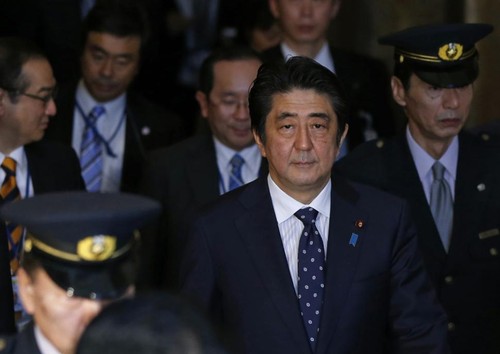(VOVworld) – The decapitation of two Japanese hostages presents Japan with a difficult choice: retreat from the fight against the IS to ensure the safety of its citizens or make uncompromising moves against terrorism. The Japanese government has confirmed there will be no change in its policies and Japan will not abandon its commitments in the anti-terror fight.
 |
The recent hostage crisis has strengthened Prime Minister Shinzo Abe’s determination to enhance Japan’s global influence and expand its role in ensuring world peace.
(photo: Toru Hanai/REUTERS) |
Japan, one of the world’s safest countries since World War II, was shocked by the beheading of two of its citizens by Islamic extremists in Syria. The incident has raised concerns over the safety of Japanese citizens inside and outside the country and boosted public support for the government’s external policies, including the approval of a Constitution that allows Japan’s Self-Defense Force a more active role in international issues.
Not leaving the fight against terrorism
It’s not the first time in history that Japan has faced such as crisis. In 1992 the Japanese parliament approved a law to allow the country to send military and civilian personnel to UN peacekeeping operations. A Japanese soldier was killed in Cambodia a year later. A Japanese hostage was killed in Iraq in 2004 after Japan sent hundreds of soldiers to help with Iraq’s reconstruction. The killing increased pressure on the government to withdraw troops and the mission ended in 2006.
When Prime Minister Shinzo Abe was reelected in 2012, he continued his efforts to strengthen Japan’s role in the international arena. Over the past two years, he has conducted several visits to countries in Latin America, Africa, Europe, and Southeast Asia. On his latest trip to the Middle East, Mr. Abe promised to provide 200 million USD in humanitarian aid to countries fighting against IS. This prompted some opposition politicians in Japan to criticize the government, saying it was humanitarian aid for the anti-terror fight that triggered the unprecedented hostage crisis.
Prime Minister Shinzo Abe has defended his policy against terrorism. At a meeting with the National Security Council following the beheading of the second hostage, Mr. Abe said Japan will not compromise with terrorism and will take appropriate measures in particular circumstances in line with national interests.
Adjusting to the new security situation
The decapitation of two Japanese citizens has not demoralized Japan. Rather, it has pushed Prime Minister Abe and legislators to revise Japan’s Constitution to allow its army to engage in hostage rescue operations abroad.
The government has been drafting a bill on the deployment of Japanese troops overseas. If it’s approved in the first quarter of this year, the Japanese army can join its allies’ operations abroad. Prime Minister Abe’s Liberal Democratic Party holds a majority in the Upper House, which provides an opportunity for him to realize his plans.
Given global security threats and a changing regional balance of power, Japan needs a flexible security policy and broader influence outside of East Asia. The government needs better crisis control through new institutions like the National Security Council. The recent hostage crisis has strengthened Mr. Abe’s determination to enhance Japan’s global influence and expand its role in ensuring world peace.